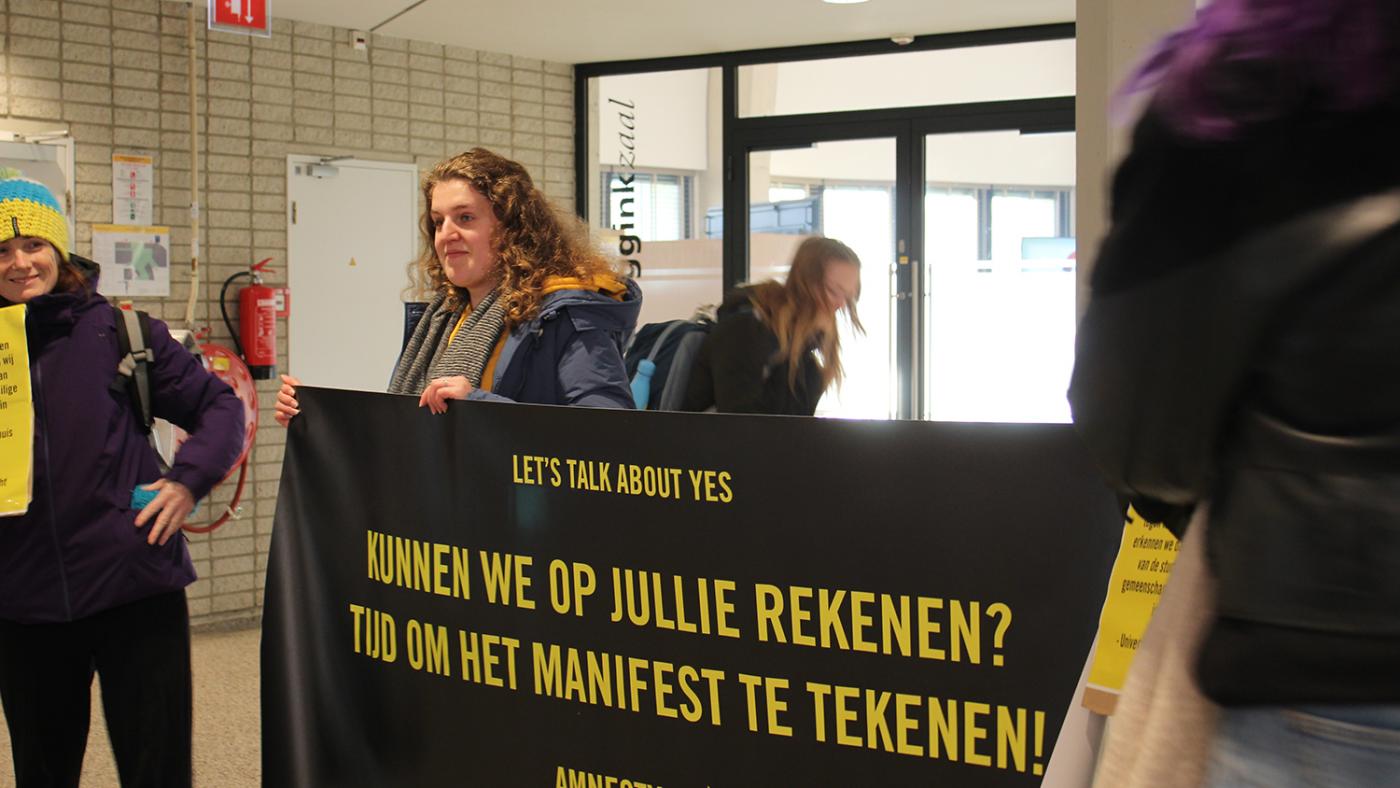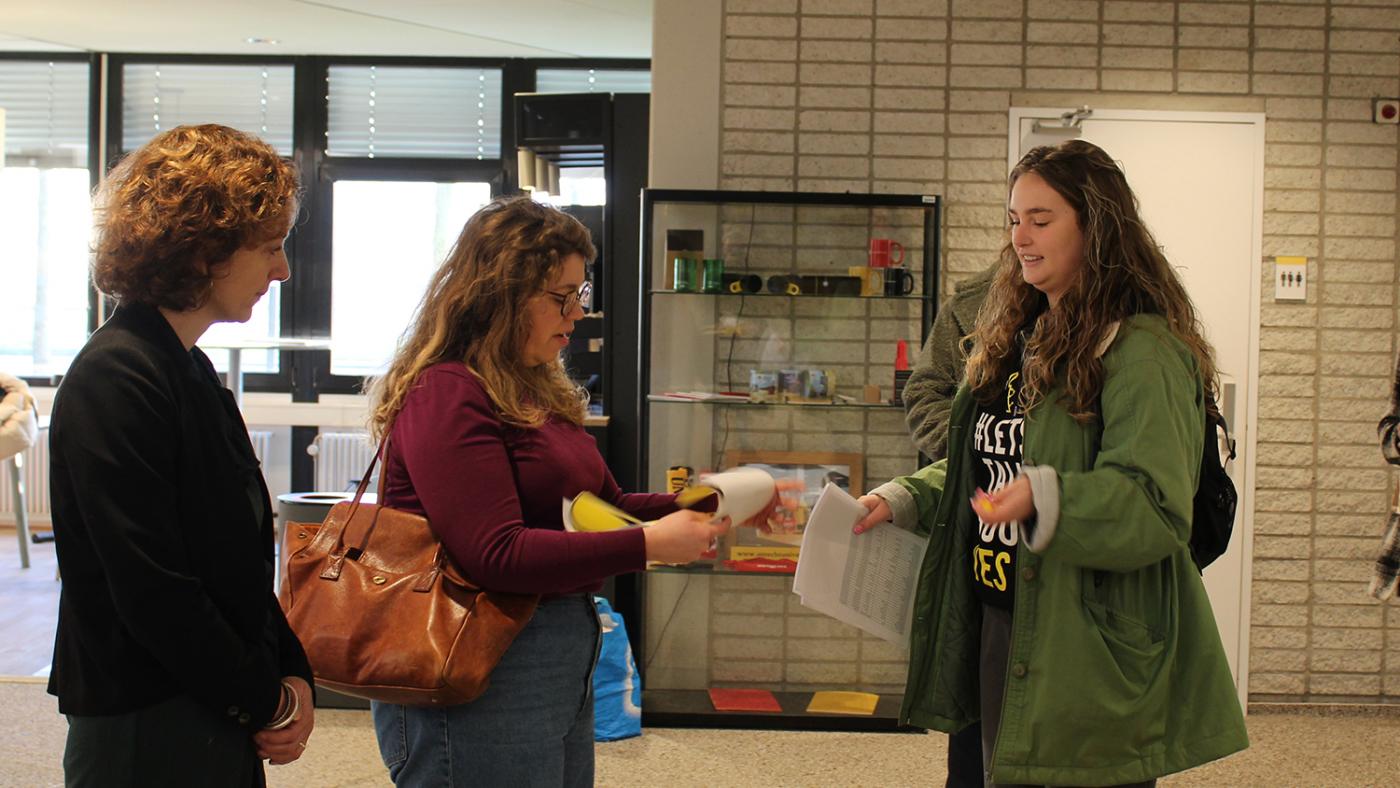23 higher education institutions already signed
Amnesty asks UU once more to sign manifest against sexual violence

According to the activists (many of whom are students at Utrecht University), signing the manifest would be a strong message against sexual misconduct. In addition, by signing, the Executive Board would show it's working on a concrete plan to tackle the issue. Law student Indy Schoenmakers, an activist at Amnesty, says: “UU claims to have been working on an internal policy for two years already. But not much is happening in practice, which is frustrating.”
The manifest is part of Amnesty’s campaign Let’s Talk About Yes, launched last year. Activists are asking higher education institutions across the country to sign a manifesto (in Dutch only, Ed.) promising to protect students against sexual assault, following a report by the same organisation according to which 1 in 10 women and 1 in 100 men are raped as college students. The manifest contains six basic steps that universities can take to this end. In Utrecht, the University of Applied Sciences and the Art School have already signed the document. UU refused.
Asked why would UU change its mind in the meantime, the activists reply that, although the content of the manifest hasn’t changed, they have strived to emphasise its urgency by starting a petition and forging alliances with student associations in Utrecht. “We want to show the university that not it's not only Amnesty that wants their signature. There are many students who think this is important too,” explains Iva Hoefnagel, who is holding up a sign with names of other institutions that have already joined in.
On behalf of UU, two people accepted the manifest and petition: Anneloes Krul, student assessor of the Executive Board, and Marieke de Bakker, head of the Student Department of the Directorate of Students, Education & Research. Indy winkingly hands them a pen: "Just in case". But Krul and De Bakker immediately explain that they cannot sign the manifest themselves. "That's up to Henk Kummeling," elucidates Krul, referring to UU's rector, who was invited for the occasion but already had other appointments.

Marieke de Bakker and Anneloes Krul receiving Amnesty's manifesto and petition on behalf of the rector. Photo: DUB
A conversation, but no signature
What followed was a conversation. Activists and board members together with a cup of coffee. After the first sip, the Amnesty members asked once more why UU's board is so hesitant to sign the manifest. In a University Council meeting held a few days earlier, student councillor Susannah Burger asked the same question to the Executive Board. President Anton Pijpers repeated the same argument used by the rector in 2021, saying that the manifest attributed too much responsibility to the university, whilst rape usually takes place outside the university's walls. In addition, UU is already taking steps to improve the safety of students and staff. For instance, it has set up an online module on consent and courses on how to be an active bystander. The university is also considering a play on the topic. Last but not least, UU's President said the university is keen to collaborate with the students involved with Let's Talk About Yes.
De Bakker and Krul repeat these arguments as well. In addition, de Bakker wonders why there is such an excessive focus on a signature. Up until now, only five of the fourteen research universities in the Netherlands signed the manifest. Surely this signature isn’t an end goal in itself?
Tte activists present shake their heads: no, signing the manifest is not an end goal, but a means to an end. They are happy that the university is working to improve safety but they feel that not enough progress has been made as of yet. The manifest would help achieve a more effective approach to sexual violence. Indy: "There’s always talk of individual projects, such as the consent module or a theatre performance. The added value of the manifest is that it offers a long-term plan. There is a constant focus on sexual safety. Such an overarching strategy helps to reflect on the effectiveness of ongoing projects."
According to the campaigners, the manifest would also make it immediately clear to the outside world that the university is committed to combating sexual violence and what goals it is going to pursue in that regard. The university might be taking steps but it’s hard for students to see exactly what is being worked on. As the petition shows, there is a great need for this.
Although nothing was signed, after the handover, the activists were happy to hear that projects to increase sexual safety are underway but they do feel that there could be more collaboration with students and that the university needs to do a better job of highlighting its plans. Indy: "We remain hopeful that the university will still take the manifest as a starting point for a long-term strategy. They are doing a good job but they still need to do a lot to improve students' sexual safety."
So far, 23 higher education institutions have signed the manifesto, in which they promise to take measures “to ensure that everyone feels responsible for a culture in which sex is based on equality and consent”. The document contains six focus points, such as providing workshops on the topic for students. Active bystander courses are a good example of that, as they teach people how to intervene when witnessing inappropriate behaviour. The manifesto also proposes to teach employees how to deal with topics such as sexual violence in a "trauma-sensitive way". All complaints procedures must also be in order.